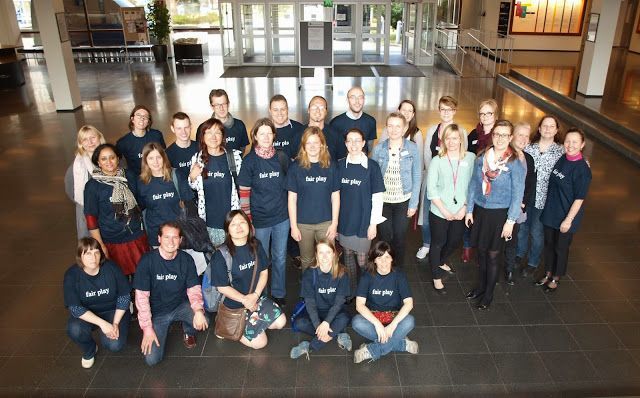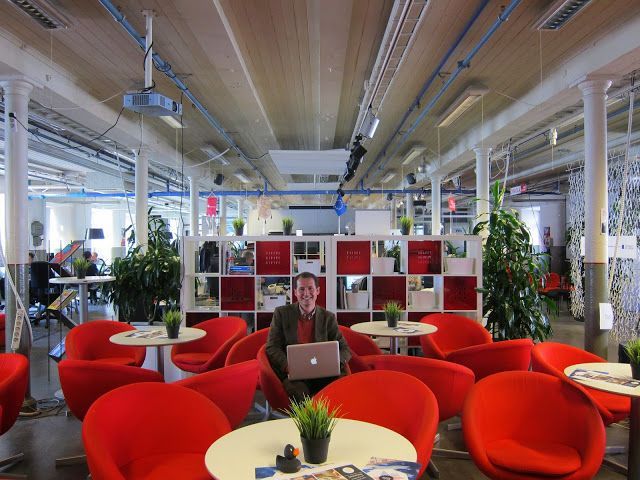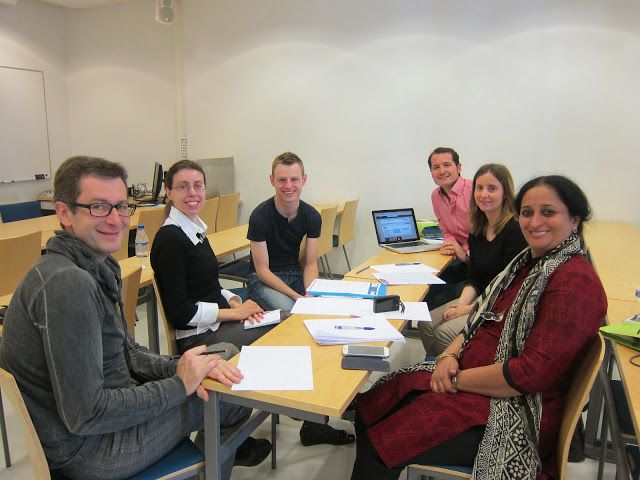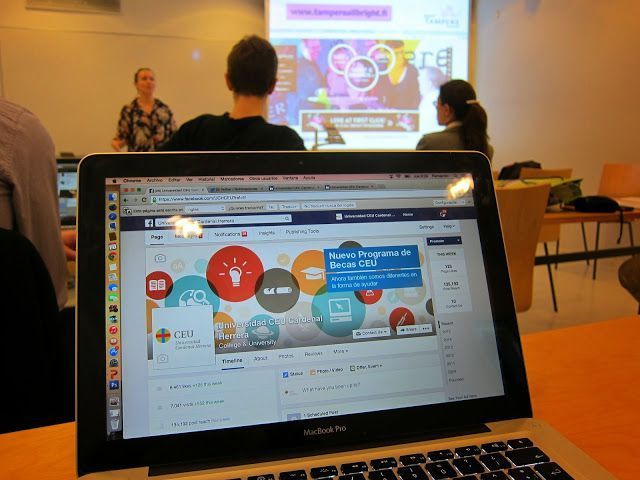Sharing expertise with your European peers and exchanging innovative ideas and best practices from other universities across the continent; these are the main objectives of Staff Mobility Programs (or iWeeks). Our university’s Community Manager and Social Media Analyst Fernando Leandro has spent a week in Tampere (Finland), where he has participated in several workshops and group discussions.
You can read the original article in Spanish on his blog, where you will also find information on his previous international experiences in Lithuania, Poland and Latvia!
“University CEU Cardenal Herrera provides its employees the opportunity to spend one week in a European university in order to gain more knowledge about certain topics and to discover new working methods and establish synergies and contacts with European colleagues.

The selection procedure is usually not easy because you need to be accepted by the host university and not all the exchange programmes offered are of interest for your working position. I can only recommend to attend “IMOTION” to gain information about all the different types of international programmes offered. In general, such an exchange programme is, without doubt, an opportunity to expand and develop your professional skills and competences.
In my case the destination of my stay abroad was the University of Tampere, Finland.
A stay abroad is a synonym for learning and growth. When you go abroad you will face four variables: the language, the culture shock of being in a new environment, the people accompanying you and the climate.
The first variable – the language
As universities we are competing in an environment which is getting more and more international. That requires language training and practice. The best possibility to do so is by spending some time abroad, which allows you to develop your language skills in the best way possible. It is a great feeling being able to understand other colleagues from different countries. It is also very interesting to discover other ways of thinking and expressing yourself. By speaking the same language, you can approach your colleagues from other countries working in the same areas as you do. Of course, it requires effort but leaving your comfort zone is the best way to grow in every field.
The second variable – the environment
Tampere is a small town despite being the third most important city in Finland. That is an advantage because it allows you to comfortably move around the place. If you are a nature lover, if you like lakes, quietness, tranquility, a peaceful area without pollution, Tampere is the perfect place for you. It is worth mentioning that the town is surrounded by two lakes: Näsi (o Näsijärvi) and Pyhä (o Pyhäjärvi). Just like in Valencia, the people often use their bicycle to move comfortably around the town; you can also see a lot of people practicing sports in the green parks, which surround the town center.
Another aspect is the Finnish education system, which is without doubt enviable and something the Finnish are very proud of. Fostering equality and thus giving everyone the possibility to study, is very important to them. They are very eager about promoting their system of equal opportunities.
Regarding their academic authorities, I realized that the class system of my University is in no way inferior to the Finnish, because it is also characterized by small groups focusing on the participation and practice of their students.

We visited DEMOLA, a collaborative environment working in direct contact with the university being in charge of the development of the students’ entrepreneurial skills. This type of alliances with incubators, startups and co-working spaces is an area in which my University is also well-developed, with the unity of “CEU Emprende” being in charge of it.
Their programme “All bright” is also worth mentioning as it focuses on the development and attraction of national and international talents. They are making substantial efforts to attract and retain brilliant people contributing value to the town.
The third variable – the people
The Finnish character is organized, disciplined, geek; Finns love literature and technology, they do not mind being alone and they are self-sufficient. They are also very friendly and ready to help you whenever they can. My personal impression is that the Finnish are nice people but extremely introverted, if they can do it on their own, they would not ask you for help. They are very independent and prefer doing things self-sufficiently.
To this fact there needs to be added that those international meetings are attended by people from other universities of other countries, which means that you do not only spend some time with Finns but that you also share experiences with – in my case – people from Poland, India, Lithuania, Greece, Germany, France, etc. – a factor which gives you a global vision and which opens your mind to multiple interpretations of your working areas. I appreciate all the enriching experiences my colleagues shared with me.

The University of Tempere organized a number of Workshops classified by areas of interests. They held interesting workshops, which were all carried out by university staff members or collaborators. Up to now, making use of marketing has not been of high importance for the University of Tampere due to the high quality of its education system, but they have realized that neglecting this aspect is like closing doors to international areas. I was pleasantly surprised about the interest for communication and marketing of countries such as Lithuania, putting their heart and soul into the promotion and internationalization of their universities.

The last variable – the CLIMATE
With a low level of pollution and 80 % humidity, we felt like being in a high mountain area when arriving to the town. Of course, the climate is the key factor which impregnates all the other aspects previously mentioned. It is obvious that the climate affects the character of the Finns, the extreme cold in winter is without doubt a reason for their self-sufficiency.
I was surprised about how short the nights there are, in May night is already falling at 11 p.m and sun rises at 4 a.m; they do not use window shutters because they would freeze otherwise – which makes it almost impossible that light does not enter during sleeping time.
The meticulous design of their numerous libraries and museums is also worth mentioning. Those are very pleasant, conveniently acclimated places which are often used by the Finnish population.
The first thing which surprised the visitors when entering the university hall was a big side room which serves as a “Great Cloakroom” where the students can hang their coats. It is a very civilized society where usually no one steals anything. Another curious aspect is that the universities have air corridors connecting all the buildings.
In terms of culture, the experience in the Sauna in Kaupinoja it is definitely extraordinary as having a sauna is quite unusual in Spain. The University of Tampere invited us to delve into their culture by experiencing something as intrinsic as the sauna, the traditional and refreshing bath in the lake of Näsijärvi – and the icing of the cake: having a delicious dinner and watching a beautiful sunset. It was an experience I will without doubt remember all my life.

I want to conclude this point with a special mention regarding their cuisine. It goes without saying that having dinner in Finland is expensive as everything. Entertainment in general is prohibitively expensive for the average person. The students can benefit from the university canteens and their menus (Lounas), which are relatively cheap compared to restaurants. Salmon is very tasty – they serve everything with sauces. Potatoes and cucumbers are also usual ingredients of their dishes. They have a special pastry which looks like a donut, is called Munkkis and is absolutely delicious. In general, they have a lot of caloric food which helps them endure the long and cold winter.
All in all, I can only recommend this programme as it is a school of life which enriches you in personal, as well as cultural and professional terms and makes the importance of establishing collaborations and fostering networking between universities visible. In conclusion, I want to thank all the institutions, the people and departments in charge of it making this type of exchange possible.”






